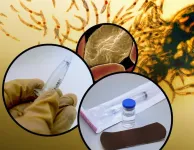(Press-News.org) August 14, 2024 – In a report published in The Lancet Infectious Diseases (Safety and efficacy of PfSPZ Vaccine against malaria in healthy adults and women anticipating pregnancy in Mali: two randomised, double-blind, placebo-controlled, phase 1 and 2 trials) a team led by investigators at the Malaria Research and Training Center (MRTC), Bamako, Mali; the Laboratory of Malaria Immunology and Vaccinology (LMIV), National Institute of Allergy and Infectious Diseases, National Institutes of Health; and Sanaria Inc. describes the durable protective efficacy against malaria shown by Sanaria® PfSPZ Vaccine when administered to women prior to pregnancy. The two clinical trials, led by Dr. Halimatou Diawara (MRTC) and Dr. Sara Healy (LMIV), were conducted in Ouélessébougou, Mali from 2018-2021. For the first time, immunization with a malaria vaccine has been shown to protect mothers from malaria during pregnancy and to protect for two transmission seasons without booster doses of vaccine.
Malaria during pregnancy is an enormous problem. Plasmodium falciparum (Pf) infection during pregnancy causes up to an estimated 50,000 maternal deaths and 200,000 stillbirths in Africa each year. “Better protection for the mother and developing fetus is urgently needed” said Professor Abdoulaye Djimde, Director of the Malaria Research and Training Center at University of Bamako. “PfSPZ Vaccine has an excellent safety profile and our teams have worked with NIH and Sanaria partners over the years to demonstrate its efficacy in Mali, where seasonal malaria transmission is intense.”
This trial recruited women who were planning to get pregnant in the coming year. After immunization, birth control was stopped in most and the women were followed through two malaria transmission seasons over nearly two years. Those who became pregnant were followed throughout their pregnancies, and newborns were followed up to their first birthday to measure long-term outcomes. The study included two vaccine groups that received low and high doses of the vaccine, respectively (100 women per group) and a placebo group receiving normal saline (also 100 women).
PfSPZ Vaccine was well-tolerated and safe for both the mothers and their offspring, with no differences evident in the rate or severity of adverse events compared to placebo. Vaccine efficacy against infection with malaria parasites in the lower dose group was as high or higher during the second year (61%) as during the first year, without boosting, a first for a malaria vaccine. Over the two seasons, efficacy against infection with malaria parasites during pregnancy was 57% in this group. In the high dose group, efficacy against malaria infection was 86% during the first year in women who became pregnant.
An unexpected finding was that pregnancy was detected earlier in the vaccine group than placebo. Although this effect had marginal statistical significance, it suggested that malaria infection likely aborts many early pregnancies before they are detected. By preventing these early infections, vaccinated women appeared to become pregnant sooner. This was actually noticed by several of the mothers: “The vaccine, I love it” said one participant; “since the start of the study I have not had malaria.” Another participant stated: “I was unable to conceive for three years after getting married, but during the study I got pregnant”.
Alassane Dicko, who leads the team in Mali, said that assessing the efficacy of PfSPZ Vaccine in women who wanted to become pregnant was the next logical and ethical step. “We were excited to see significant vaccine efficacy against Pf infection not only in the first year but through a second intense malaria transmission when administered pre-conception. This is a tremendous advance for protecting women against malaria before and during pregnancy. We were also surprised to find an additional positive outcome, that pregnancies developed sooner in vaccinated participants.”
Sanaria founder and CEO, Stephen L. Hoffman, MD said, “Sanaria’s PfSPZ Vaccine has a long and excellent safety and tolerability record, and has shown strong and durable protection against Pf infection in multiple studies in Africa. The results of this study in women of child-bearing potential demonstrate clearly its potential to save the lives of women and their unborn babies in Africa.” Hoffman believes the vaccine will be best administered to adolescent girls prior to any pregnancies, who would then get boosted at the time of pregnancy. A full immunization series would be given to any pregnant women not previously immunized. The next step will be to demonstrate the safety and efficacy of PfSPZ Vaccine in pregnant women.
“While pregnant women are typically excluded from many clinical studies, given the scale of the problem and the profound effects of malaria on women of child-bearing potential, there is an ethical imperative to design and test interventions for this vulnerable group” said Rose Leke, Profesor, University of Cameroon, winner of the 2023 Virchow Prize for Global Health, and chair of the Gavi (Global Alliance for Vaccines and Immunizations) independent review committee. “ I applaud this research team for successfully pioneering the safe testing of PfSPZ Vaccine in young women and achieving such promising results on preventing malaria in pregnancy.”
About Sanaria Inc.:
Sanaria Inc. was founded in 2003. The Company's primary mission since the outset has been to develop and commercialize whole-parasite malaria vaccines that confer high-level, long-lasting protection against Plasmodium falciparum, the parasite responsible for most of the malaria-associated severe illness and death worldwide, as well as other parasites that cause human malaria. Sanaria Inc. seeks to use these vaccines to prevent malaria in individuals and eliminate the disease from entire populations in selected regions. Sanaria's corporate headquarters, administrative, research, development, and manufacturing operations are in Rockville, Maryland. The Company's website is www.sanaria.com
This news release contains certain forward-looking statements that involve known and unknown risks and uncertainties, which may cause actual results to differ materially from anticipated results or achievements expressed or implied by the statements made. Such statements include the availability of an effective vaccine, the expectations for eliminating malaria, and beliefs concerning the suitability of a successful vaccine. These forward-looking statements are further qualified by important factors that could cause actual results to differ materially from those in the forward-looking statements. These factors include, without limitation, the Company's ability to raise sufficient funds, the regulatory approval process, clinical trials results, the Company's patent portfolio, dependence on key personnel and other risks associated with vaccine development. For further information contact Alexander Hoffman, press@sanaria.com, 301-770-3222.
END
WHAT:
Two National Institutes of Health (NIH)-supported trials of an experimental malaria vaccine in healthy Malian adults found that all three tested regimens were safe. One of the trials enrolled 300 healthy women ages 18 to 38 years who anticipated becoming pregnant soon after immunization. That trial began with drug treatment to remove malaria parasites, followed by three injections spaced over a month of either saline placebo or the investigational vaccine at one of two dosages. Both dosages of the vaccine candidate conferred a significant degree of protection from parasite infection and clinical malaria that was sustained ...
Babies recognise pretence and around half of children can pretend themselves by 12 months, new research has found.
The study, led by the University of Bristol, shows for the first time how children’s awareness and grasp of pretence in its various forms develops from birth to three years.
Lead author Prof Elena Hoicka, Professor of Psychology in Education at the University’s School of Education, said: “Our findings highlight how pretending is a complex, evolving process which begins very early on in life, helping their cognitive and social skills to advance. Pretence ...
A new paper from the Smith School of Enterprise and the Environment, University of Oxford concludes that current climate standards are not sufficiently incentivising the big picture innovations necessary to deliver net zero, and must be expanded to include a company’s broader influence on climate action. The peer-reviewed research, published in Carbon Management, comes after a period of fierce public debate about climate standards and offers possible solutions for those seeking to improve both integrity and impact of corporate climate action.
Incentivising climate action and innovation in the corporate world is essential says co-author Dr Matilda Becker: “Of the 2000 largest ...
Anahita Khojandi and Xiaopeng Zhao have been selected by the American Association for the Advancement of Science (AAAS) to participate in the 2024-25 Science & Technology Policy Fellowship (STPF).
Khojandi, a Heath Endowed Faculty Fellow in Business & Engineering and Associate Professor in the Department of Industrial and Systems Engineering, and Zhao, a professor in the Department of Mechanical, Aerospace, and Biomedical Engineering and founding director of the Applied AI Program ...
New research from UC Santa Cruz is finally giving you the go-ahead to sing in the shower as loud as you want. Because, as it turns out, you probably sound pretty darn good.
Psychologists wanted to study “earworms,” the types of songs that get stuck in your head and play automatically on a loop. So they asked people to sing out any earworms they were experiencing and record them on their phones when prompted at random times throughout the day. When researchers analyzed the recordings, they found that a remarkable proportion of them perfectly matched the pitch of the original songs they were based upon.
More specifically, 44.7% of recordings had a pitch error of 0 semitones, ...
Providing cancer care for someone who also has a chronic illness, such as diabetes or high blood pressure, requires a systematic, co-management approach to produce better cancer and overall health outcomes, said UNC Lineberger Comprehensive Cancer Center’s Samuel Cykert, MD.
Cancer patients with a chronic illness often experience poorer outcomes. This is especially true for Black patients. Contributing to this disparity, studies show, is the increased likelihood that people with chronic illnesses may not be offered standard cancer treatments like surgery, chemotherapy or radiation. If they do start standard treatment, they might not complete it due to complications from ...
CHICAGO—August 14, 2024—Each year, the American Ornithological Society (AOS) confers awards on individuals and groups for their ornithological research and notable contributions to the science and practice of ornithology, and for their service to the society. Our 2024 awardees represent outstanding contributions to the scientific study and conservation of birds and to the AOS. The 2024 recipients will accept their awards at the AOS annual meeting (AOS 2024) in Estes Park, Colorado, in October.
“Our award winners this year epitomize the excellence in research, publications, service, and conservation in ornithology towards which we all strive in our profession,” ...
Researchers at Children’s Hospital of Philadelphia (CHOP), St. Jude Children’s Research Hospital (St. Jude) and the Children’s Oncology Group (COG) today announced a significant paradigm shift in the understanding of T-lineage acute lymphoblastic leukemia (T-ALL), an aggressive and high-risk form of cancer, to one frequently driven by genetic changes in non-coding portions of our DNA. The collaborative study, supported by the Gabriella Miller Kids First Pediatric Research Program (Kids First) and National Institutes of Health (NIH) Common Fund, was published ...
A WEHI study could help solve a long-standing mystery into why a key immune organ in our bodies shrinks and loses its function as we get older.
The thymus is an organ essential for good health due to its ability to produce special immune cells that are responsible for fighting infections and cancer.
In a world-first, researchers have uncovered new cells that drive this ageing process in the thymus – significant findings that could unlock a way to restore function in the thymus and prevent our immunity from waning as we age.
Watch and embed the video: https://youtu.be/2x1UGqNh77w
At a glance
The thymus is an organ essential for our immune defence ...
Key takeaways
Venting about your frustrations with one friend to another may feel good, but it doesn’t necessarily reduce anger.
Experiments showed that people who listened to a friend vent liked and supported that person more than those who were vented about — but only if the person venting didn’t derogate or seem aggressive toward the other friend.
Venting might be an effective tool of competition for listeners’ affections precisely because it is not readily recognized as a tool of competition.
Venting about your frustrations with one friend to another isn’t necessarily cathartic, but it can make the friend you’re talking to like and ...



